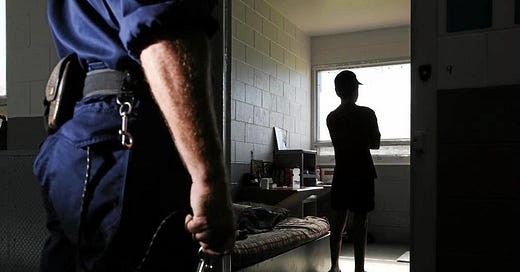The most basic crime prevention strategy we have is ending poverty… / A.J. Hendry
Political leaders have been asking themselves why? Why are we seeing so much crime in our communities? The reality is, where you find communities locked in poverty, you find crime...
Personal responsibility.
It’s the ground on which much of this debate around crime has been fought. Politicians demand that children take personal responsibility for their actions. That parents are kept accountable for the actions of their children. That someone pays a price.
But, what about our collective responsibility? As a community?
What responsibility to do we have for ensuring that we are building a society where everyone of us has equitable access to a good life?
Back when I was a young youth worker, I remember being asked to support a young person who was getting into some trouble down in my local community. He was getting into some petty crime and that had recently begun to escalate.
After meeting with him and his whānau, it became apparent that there was more going on under the hood than was initially apparent.
He was a child really. Under 14 and with an intellectual disability that impaired his judgement and made it easy for him to be swayed and influenced by others. His family loved him. Yet, they didn’t have the resources to support him with his disability, and they were also experiencing poverty and despite mum working long hours, were struggling to make ends meet.
There’s a lot of negative stereotypes about families with children who offend, but the parents I meet whose kids are getting into trouble, do truly love and care for their children. This whānau was no different. They were not lacking for love. No, they had that in spades. Rather, the problem was that they lacked the basic resources they needed to be able to provide the support their tamariki needed to truly thrive.
As a result, this young man found himself hanging out with local kids in his area, each of them equally going through their own stuff, and eventually getting into trouble and ending up in the justice system together.
Harsher punishments and more police would not have stopped this child’s offending. Punitive sanction on his mother, also would not have prevent this child from becoming involved in crime.
What this whānau needed was support. They lacked the resources they needed to sufficiently care for each other, and to provide their young man with what he needed to thrive.
And I would emphasis again, not for lack of trying. They were taking personal responsibility, doing everything they could to care for their boy, but they were struggling within a system that was not designed to support them. A system that has arisen from our collective failure to build a society where all of us have success to the resources we need to thrive.
One of the most basic crime prevention strategies we have is ending poverty.
The psychological, material, and financial strain poverty has can have devasting impacts on whānau, often exacerbating some challenges families are facing while creating others.
The social exclusion caused by poverty is one of the leading factors that contribute to children and young people becoming involved in crime.
It also has a clear fix. Ensure all our whānau have the resources they need to thrive. This is bread and butter politics at its best. We don’t get more basic than making certain that every child has food on the table, a roof over their head, access to good health care and the ability to grow up in a safe and stable community.
Tragically, the systems we've designed to distribute our nation’s wealth aren't fit to serve us. Rather than ensuring we have enough to provide the basics for our people, they privilege a few while denying the many.
There was a lot of hand ringing (from all sides of the political spectrum) about the Greens ambitious policy to eradicate poverty through reforming our tax system and ensuring everyone in our society has a basic living income. Perhaps you think their policy is too ambitious?
But the question is, if not the Green’s proposal? What?
Because the status quo is not working.
If our political leaders wish to have the mana to speak into issues of crime prevention and personal responsibility for children who offend, than they need to equally take up the wero of ending poverty in this nation.
Political leaders and commentators have been asking themselves why? Why are we seeing so much crime and violence in our communities? Scratching their heads, and looking at each other for answers, while ignoring what we know about crime the world over.
The reality is, where you find communities locked in poverty, in societies that allow extreme inequality to flourish, you find crime. And over the last few years, inequality has only gotten worse. With many on the margins of our society finding themselves less and less able to access the basic resources many of us take for granted.
Inequality and poverty are the result of political choices we continue to make.
However, the good news is, we can make different ones.
We can choose to build a society where all our children have their most basic needs met.
One where poverty and extreme inequality are but a thing of the past.
It is possible for things to change.
That choice, however, is up to us.
Will we take hold of our collective responsibility and act?
Or will we choose to allow our children to suffer?
A.J. Hendry is a Laidlaw College graduate, and a Youth Development Worker and rangatahi advocate, working in the Youth Housing and Homelessness space. He leads a service supporting rangatahi experiencing homelessness and is also an advocate working collectively to end youth homelessness in Aotearoa. He is also the curator and creator of When Lambs Are Silent.





